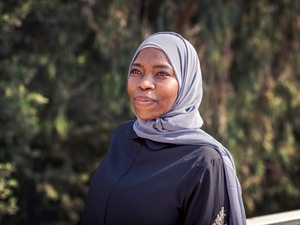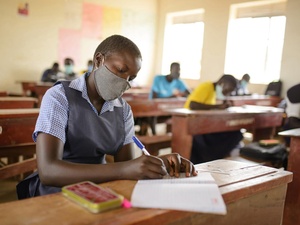"Lost Boy" among graduates ending Ethiopian exile to help rebuild South Sudan
"Lost Boy" among graduates ending Ethiopian exile to help rebuild South Sudan

Makuei Joseph Magai (right) and Simon Pech hold their college diplomas. They plan to help rebuild South Sudan.
ADDIS ABABA, Ethiopia, August 17 (UNHCR) - South Sudan desperately needs people like Makuei Joseph Magai and Simon Pech. The two 27-year-old refugees, armed with valuable college degrees, left the Ethiopian capital of Addis Ababa last Monday for the town of Juba in their devastated homeland.
They were among a group of five men holding degrees from Ethiopian institutions in a wide range of important development-linked subjects who were taking advantage of a voluntary repatriation programme for Sudanese refugees in Ethiopia launched by the UN refugee agency in March last year.
Magai and Pech both gained their higher education degrees through UNHCR's annual DAFI scholarship programme, more formally known as the Albert Einstein German Academic Refugee Initiative. The German government-funded programme grants deserving young refugees scholarships at universities, colleges and polytechnics in their host countries.
The main aim of the DAFI programme is to contribute to human resources development as part of a broader UNHCR strategy of promoting self-reliance and durable solutions for refugees. Magai and Pech's expertise will allow them to contribute to the resurrection of South Sudan, where years of war destroyed infrastructure and left the economy in tatters before a 2005 peace accord.
The 27-year-old Magai, one of the so-called "Lost Boys" who fled southern Sudan without their families, recently graduated from northern Ethiopia's Makalle University with a bachelor's degree in dryland agriculture and horticultural science.
"I would like to go home and use my knowledge for the betterment of my country and people," he said before heading home. "I believe I have acquired this knowledge at a crucial time, when South Sudan needs more skilled and educated men and women to make it a prosperous country."
It has been quite an achievement for Magai, who was illiterate when he first fled to Ethiopia in 1988 at the start of a peripatetic journey that took him over the years back to Sudan and on to Kenya before returning to Ethiopia. But he worries about his parents and siblings, whom he has not seen in two decades.
Pech, who fled South Sudan in 1997, was also keen to help make a difference back home with his economics degree from Bahir Dar University in north-western Ethiopia. "I am a qualified economist and would like to be given the opportunity to help lead my native Unity State out extreme economic deprivation," he said, flashing a broad smile.
As security improves, more people are opting to return to South Sudan, including professionals and college graduates from neighbouring countries and further afield. They include the Lost Boys - some 12,000 orphaned or unaccompanied young refugees of whom 3,600 were resettled in the United States in recent years after making epic journeys to reach sanctuary overseas.
UNHCR is fully supportive of the educated Sudanese who are returning home. "South Sudan today needs to build a strong local capacity that is the key for the continuing reconstruction process and these educated returnees will no doubt play a catalytic role," said Cosmas Chanda, deputy representative of UNHCR's Regional Liaison Office for Africa. They could also encourage other members of the South Sudan diaspora to return.
In the seven years it has been involved in promoting higher education in Ethiopia, the DAFI programme has funded the education of hundreds of refugees, most of them Sudanese. They have studied subjects ranging from engineering and economics to medical science and agriculture.
The UN refugee agency has helped more than 20,000 Sudanese refugees in Ethiopia to go back home. The repatriation operation was suspended in May due to heavy rains, but it is expected to resume in November. In total, some 157,000 refugees have so far returned to southern Sudan with or without UNHCR help.
By Kisut Gebre Egziabher in Addis Ababa, Ethiopia









